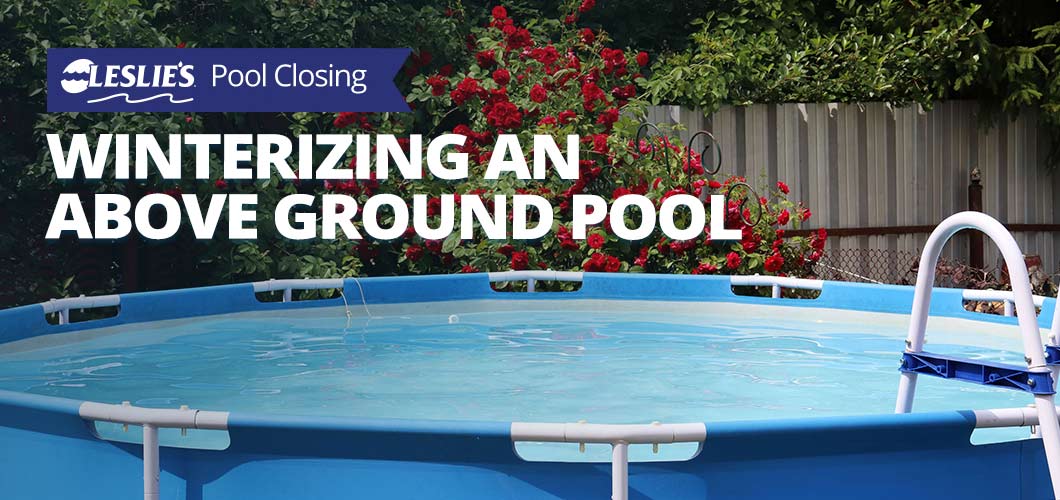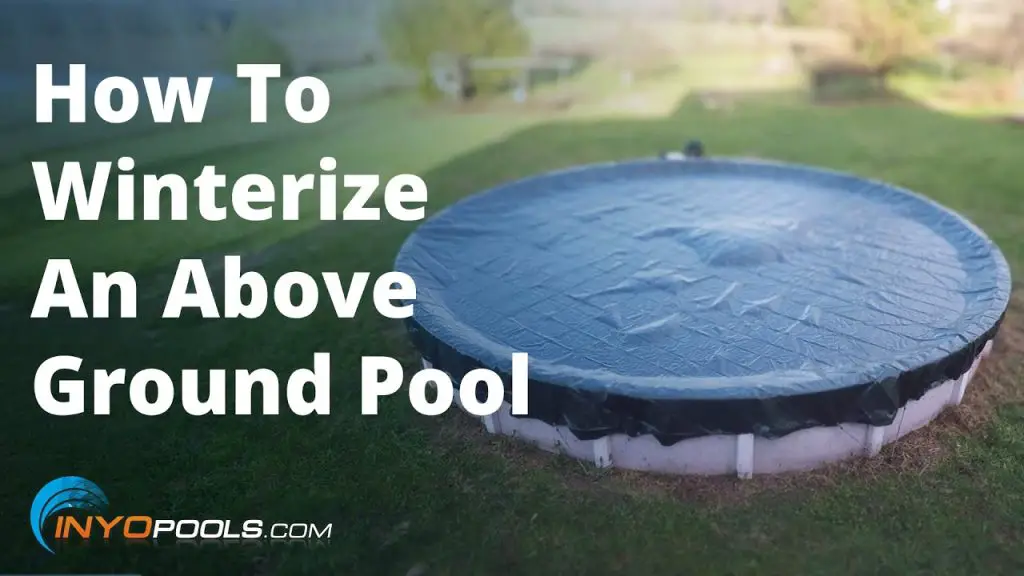To winterize an above ground pool, drain the water below the skimmer and return jet level, disconnect and store all accessories, clean the pool thoroughly, and cover it with a pool cover to protect it from debris and freezing temperatures. Winterizing an above ground pool involves several important steps to protect it during the colder months.
This process ensures that the pool remains in good condition and ready for use when the warmer weather returns. By draining the water below the skimmer and return jet level, disconnecting and storing all accessories, thoroughly cleaning the pool, and covering it with a pool cover, you can safeguard it from debris and the damaging effects of freezing temperatures.
In this guide, we will provide a detailed explanation of how to winterize an above ground pool, ensuring that you can enjoy it for years to come.
Step 1: Clean And Balance Water Chemistry
When it comes to winterizing your above ground pool, the first step is to clean and balance the water chemistry. This helps to ensure that your pool is properly maintained during the winter months, preventing damage and making it easier to reopen when the weather warms up again.
Remove Debris
Start by removing any debris from the pool, including leaves, insects, and other items that may have accumulated on the surface or sunk to the bottom. Use a skimmer or a leaf net to clear the water and brush and vacuum the pool to remove any dirt or algae buildup on the walls and floor.
Test And Adjust Ph Levels
Next, it’s important to test and adjust the pH levels of the water. A pH level between 7.2 and 7.6 is ideal for winterizing your pool. Use a testing kit to check the pH levels and add the necessary chemicals to bring it into the appropriate range. This helps to prevent corrosion and scale buildup during the winter months.
By following these steps to clean and balance the water chemistry, you can ensure that your above ground pool is properly prepared for the winter season.

Credit: www.swimmingpool.com
Step 2: Lower Water Level And Drain Equipment
When winterizing an above ground pool, Step 2 involves lowering the water level and draining equipment. Properly performing this step is essential to prevent any damage during the winter months.
Drain Pipes And Filtration System
First, make sure to turn off the power to the filtration system. Then, drain the pipes and filtration system completely to avoid any water freezing and causing damage. Ensure that all water is drained from the system to prevent any potential freezing and cracking.
Remove And Store Hoses And Skimmer Baskets
After draining the pipes and filtration system, it is important to remove and store hoses and skimmer baskets. Start by disconnecting and removing all hoses, including the backwash and return hoses. Thoroughly clean and dry the hoses before storing them in a dry location. Next, remove the skimmer baskets and clean them properly. Once cleaned, store them in a secure place to protect them from any potential damage during the winter.
Step 3: Protect Pool Structure
To protect the structure of your above ground pool during winter, ensure to use a pool cover to prevent debris accumulation. This step helps to maintain the integrity of the pool and prolong its lifespan, keeping it in top condition for the next swimming season.
Cover Pool With A Winter Pool Cover
Before winter sets in, cover your above ground pool using a winter pool cover to shield it from harsh weather conditions.
Secure Cover
Use a secure method to fasten the winter pool cover tightly over the pool to prevent it from coming loose.
Wrap Pool Equipment
Ensure all pool equipment such as ladders, skimmers, and hoses are wrapped securely to protect them from the elements during winter.
Step 4: Winterize Pool Equipment
Winterizing your above ground pool is crucial to ensure the longevity of your pool equipment. In step 4, focus on winterizing the pool equipment to protect it from the harsh winter conditions.
As we move forward in our journey of winterizing above ground pools, it is crucial to pay attention to the pool equipment. Properly winterizing your pool equipment, including the pump, filter, and heater, will help prevent damage and ensure a smooth opening next summer.
Winterize Pump And Filter
Preparing your pool pump and filter for the winter season is an essential step to protect them from freezing temperatures and potential damage.
- Start by shutting off the power to the pump and filter system. This will prevent any accidents or mishaps during the winter season.
- Drain all water from the pump and filter by loosening the drain plugs. Make sure to remove any debris or clogs as well.
- Remove any hoses or connectors attached to the pump and filter. Clean and dry them thoroughly before storing them in a safe place.
- Consider using a pool antifreeze or a pool winterizing kit to treat the pump and filter system. This will help protect them from freezing and potential damage caused by ice formation.
Protect Pool Heater And Other Equipment
In addition to winterizing the pump and filter, it is important to take measures to protect other pool equipment, such as the heater and any other items you may have. Here are some steps you can follow:
- Make sure to turn off the power supply to the heater and any other electrical equipment.
- Disconnect and drain any hoses or pipes connected to the heater. Remove any debris or build-up that may be present.
- For gas heaters, it is a good idea to shut off the gas supply and follow the manufacturer’s instructions for winterizing.
- Store any smaller pool equipment, such as pool toys, skimmers, or brushes, in a clean and dry place for the winter season.
By properly winterizing your pool equipment, you can protect them from potential damage and ensure a hassle-free pool opening when the warmer months arrive. Take the necessary steps to prepare your pump, filter, heater, and other equipment now, and you’ll thank yourself later.
Step 5: Additional Tips And Precautions
Antifreeze In Pipes
Using antifreeze in pipes is essential to prevent damage from freezing temperatures. Ensure that you use a non-toxic, antifreeze specifically designed for pools. Follow the manufacturer’s instructions carefully and pour the appropriate amount into the plumbing lines to safeguard them from freezing and cracking during the winter months.
Winterize Pool Accessories
When winterizing your above-ground pool, don’t overlook the pool accessories. Clean and store all pool accessories like ladders, skimmers, and pool toys properly. Storing these items in a dry, temperature-controlled environment will prolong their lifespan and ensure they are ready for use when you reopen your pool in the spring.

Credit: lesliespool.com
Step 6: Professional Help And Maintenance Services
After completing the initial steps to winterize your above ground pool, it may be necessary to seek professional help and maintenance services to ensure a seamless and effective process. Professional assistance can provide valuable expertise and relieve the burden of complex tasks, making the winterization process hassle-free.
When To Seek Professional Help
Professional help should be considered when facing challenges such as intricate pool equipment, lack of time, or if you’re unfamiliar with specific maintenance techniques. It’s also beneficial to seek professional aid if you want to avoid potential costly mistakes that could damage your pool.
Benefits Of Professional Winterization
- Expertise: Professionals possess in-depth knowledge and experience in pool maintenance, ensuring thorough and effective winterization.
- Efficiency: Hiring professionals saves time and effort, allowing for a swift and efficient winterization process.
- Peace of Mind: Professional maintenance provides confidence that your pool is adequately prepared for the winter season, minimizing potential damage and future repairs.

Credit: www.youtube.com
Conclusion
To wrap it up, winterizing your above ground pool is essential for its protection and longevity. By following the steps outlined in this guide, you can ensure that your pool remains in top condition during the colder months. Don’t forget maintenance to enjoy a hassle-free pool next summer.





